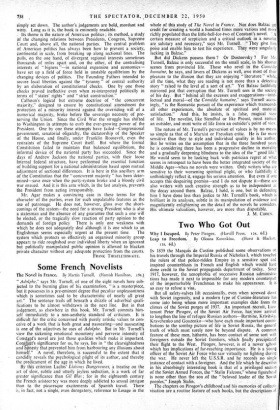Two Who Got Out
Why I Escaped. By Peter Pirogov. (Harvill Press. I as. 6d.) IN 1839 the Marquis de Custine published some observations on his travels through the Imperial Russia of Nicholas I, which touched the rulers of that police-ridden Empire in a sensitive spot and inspired counterblasts in French and English which would have done credit to the Soviet propaganda department of today. Sine 1917, however, the xenophobia of successive Russian administra- tions has made it next to impossible for any modern counterpart of the imperturbable Frenchman to make his appearance. It is so easy to refuse a visa.
But all safety-valves lift occasionally, even when screwed down with Soviet ingenuity, and a modern type of Custine-literature has come into being whose more important examples date from the climax of the Soviet purges of 1937. An important recruit, Lieu- tenant Peter Pirogov, of the Soviet Air Force, has!now arrived to lengthen the line drefugee Russian authors—Barrnine, Krivitsky. Kravchenko and Gouzenko—who have each made important contri- butions to the sombrp picture of life in Soviet Russia, the genera truth of which must surely now be beyond dispute. A common feature of these -men, hitherto, has been contact of some sort with foreigners outside the Soviet frontiers, which nally precipitated their flight to the West. Pirogov, however, is of a newer sghoo which has implications of far-reaching importance. He is a foung officer of the Soviet Air Force who saw virtually no fighting during the war. He .never left the U.S.S.R. and he records no single instance of contact with a foreigner. And the life which he describes in his absorbingly interesting book is that of a privileged section of the Soviet Armed Forces, the "Stalin Falcons," whose figurehead is none other than the son .of the "beloved leader of the Soviet peoples," Joseph Stalin. .
The chapters on Pirogov's childhood and his memories of collecti- visation are a routine feature of such books, but the descriptions of life in Soviet Air Force barracks 'carry conviction. Apart trom certain Slavonic refinements, the barrack-room life of a Soviet recruit is not so very different from that of his fellows the world over, but the reader's interest quickens as Pirogov describes the operation of the " Smersh " organisation, the system of intimate personal surveillance within the armed forces which has brought an ancient Russian institution to new heights of evil efficiency. A chapter headed "Five Seconds over Red Square," one of the best in the book, is a simple narrative of Pirogov's experiences in preparing for a May Day Parade. The extOrdinary security measures which he describes reflect the mistrust Which obsesses he minds of the Russian leaders, over whose heads the bombers must fly to display the might of Soviet air-power. Pirogov gives us a fascinating glimpse of Russian psychology, as We read of the mental conflict which ended in the voluntary return to Russia of Barsov, the pilot who flew him to the West. It is clear that the reception of these deserters by the Americans had much to do with Barsov's decision, by adding in some way to the terror of the unknown which eventu- ally triumphed over the fear of the all-too-well-known from which he had fled.
By contrast, Leap to Free, by Oksana Kosenkina, is of lighter stuff, belonging to the e-41Ber category of such books The nostalgic childhood chapters areitf conventional pattern, but there is an absorbing picture of perscintit relationships within the Soviet colony in New York which stimulates the imagination when we consider the atmosphere of dew* objectivity which broods over the environs of Kensington Palace Gardens. The author gives us a valuable impression of Alexandrov, whose fall from grace took place not long after her interview with him in the offices of the Central Committee in Moscow. As in the case of Barsov, a reaction of some violence impelled Kosenkina to give herself up to the Soviet authorities after her first rather casually-planned escape. An understandable reticence leaves us in ignorance of the precise circumstances which caused this reaction, but it is to be hoped that the underlying moral 'of both incidents will not be lost on the appropriate authorities. One question must remain unanswered. If Barsov had had his second chance, would he, too, have jumped from the Consulate window before the eyes of a waiting American crowd ?
These two books, Pirogov's ji; particular, will fill gaps of some importance in the mosaic of ourliriowledge of contemporary Russia. Pirogov's special contribution is the clear and convincing exposition which he gives us of a fundamental malaise which is driving a trickle of courageous Russians to seek refuge outside from the hopelessness of their lives in the Soviet Union. If the fall extent of this malaise were to be proved, and the resulting weakness of the Soviet war-machine authoritatively assessed, the vexed question of Western European rearmament would be vastly simplified It is to be feared that, in books of this kind, the transatlantic type of dialogue has come to stay, but in other respects Pirogov, like Kravchenko, has been largely successful in resisting the per- vading influence of hi§ shadowy American editors.
RICHARD CHANCELLOR.



































 Previous page
Previous page